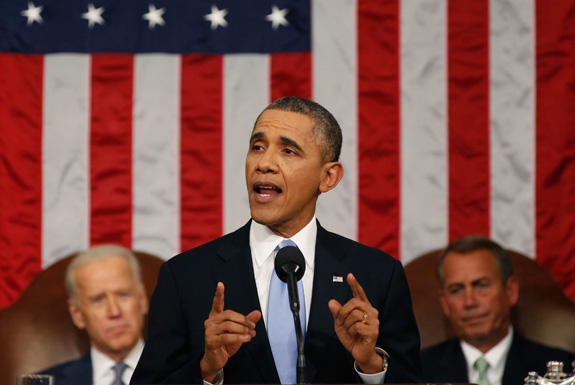Workers With Disabilities Left Out Of Obama Wage Plan

President Barack Obama pledged in his State of the Union address to raise the minimum wage that federal contractors must pay their workers, but advocates say the plan leaves out many with disabilities. (Pool photo Larry Downing/Reuters/MCT)
Advocates are crying foul after learning that many individuals with disabilities will likely be left out of President Barack Obama’s plan to hike the minimum wage for federal contractors.
Obama said in his State of the Union address earlier this week that he will issue an executive order mandating that federal contractors pay their workers no less than $10.10 per hour.
“In the coming weeks, I will issue an executive order requiring federal contractors to pay their federally-funded employees a fair wage of at least $10.10 an hour — because if you cook our troops’ meals or wash their dishes, you shouldn’t have to live in poverty,” Obama said.
Advertisement - Continue Reading Below
But now advocates say they are being told that the plan excludes people with disabilities who currently earn less than the federal minimum of $7.25 per hour.
Employers — including many with federal government contracts — can obtain special permission from the U.S. Department of Labor to pay those with disabilities less than minimum wage under a provision that’s been in place since the 1930s. Many disability advocacy groups have urged an end to the policy in recent years arguing that it is outdated and unfairly encourages segregation.
It’s unclear how many people earn less than minimum wage as employees of federal contractors, but the AbilityOne Program, which facilitates federal contracts for employers of those with disabilities, says that nearly 50,000 people with disabilities were employed through its programs in 2012, many of whom are believed to be working for subminimum wage.
In a call this week with U.S. Secretary of Labor Tom Perez and Vice President Joe Biden, disability advocates say they were told that the executive order would not alter the ability of approved federal contractors to continue paying people with disabilities less than minimum wage, though such workers could see a slight uptick in pay. That’s because subminimum wage is often calculated as a percentage of the pay that a typical worker would earn for the same job.
Now disability groups are uniting to ask Obama to reconsider.
“This may mean that a worker receiving pennies an hour today may receive a dime as a result of the executive order. Surely we can do better than this,” wrote Jeff Rosen, chairperson of the National Council on Disability, an independent federal agency tasked with advising Congress and the president on disability issues, in a letter to Perez and Obama.
Meanwhile, a separate letter to the administration organized by the Collaboration to Promote Self Determination has support from the Autism Society, the National Down Syndrome Congress, the Autistic Self Advocacy Network and TASH, among others.
“All employees of federal contractors should mean all employees, regardless of disability status,” the letter says.
White House officials declined to offer specifics about the executive order Obama will issue, but said that any changes to the current subminimum wage laws would require action from Congress. Further details about the executive order will be released “in the near future,” an administration spokesman said.
Advocates insist, however, that the president does have the authority to act unilaterally.
“We believe that if they president has the power to require government contractors to pay a higher wage for workers without disabilities that he can do the same for workers with disabilities,” said Ari Ne’eman, president of the Autistic Self Advocacy Network.
Read more stories like this one. Sign up for Disability Scoop's free email newsletter to get the latest developmental disability news sent straight to your inbox.


